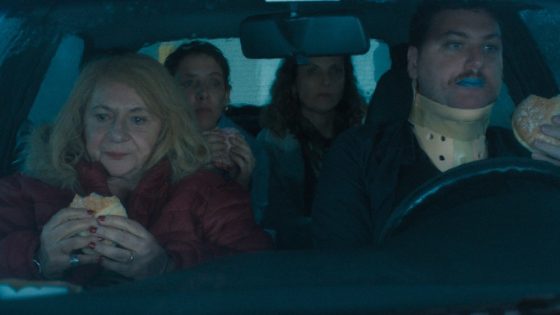Iair Said‘s first fiction feature, “Most People Die on Sundays,” will world premiere in this year’s Acid section at Cannes, although until recently, the filmmaker knew little about the platform.
“It was something new to me,” he told Variety in a recent interview when asked about being picked for this year’s lineup. “I’m not very informed about these kinds of industry things; I just make films to express myself.”
Although the Acid sidebar is new to Said, this isn’t his first time at Cannes. The director’s second short film, “Presente imperfecto,” screened in the festival’s main short film competition in 2015.
Loosely based on Said’s real-life experiences when his own father died, “Most People Die on Sunday” is the story of David, a chubby, promiscuous, gay, middle-class Jewish man from Buenos Aires in his 30s who lives in a state of arrested development. He spends too much time sleeping, aided by pills, and constantly procrastinates when it comes to essential responsibilities. In the film’s first scene, he cuts an unsympathetic figure, writing on the ground of a hotel room, half-naked and loudly weeping for an offscreen lover to forgive him.
During a return trip home after a year spent studying in Italy, David learns that his mother plans to disconnect his father’s respirator, as there is no chance of the man emerging from a lengthy coma. Circumstances do little to help David mature until he is finally forced to face his father’s mortality head-on and begin thinking about the future in concrete terms.
In addition to writing and directing, Said stars as David. He is joined by legendary Latin American stage and screen actor Rita Cortese (“Wild Tales,” “Herencia”), famous Argentine singer Juliana Gattas and Pablo Larrain favorite Antonia Zegers (“The Club,” The Punishment”).
“Most People Die on Sundays” is produced by Argentina’s Campo Cine and co-produced by Patatgonik Film Group (Argentina), Dispàrte (Italy) and Nephilim (Spain). Heretic handles international sales.
Said recently spoke with Variety about the film’s real-life inspirations, his favorite scenes and turning audience animosity into empathy.
Variety: This film is loosely based on your own experience when your father passed away. Can you talk about transcribing those emotions into a fictional screenplay and why you needed to do it?
Said: I have to start by saying that this film is not a true story. My mom asked me to make sure everyone knew it was not real because my first film was a documentary about my family, and she was in that film. But this film is inspired by real life. I wrote it in the three years before my dad died, so while it’s not true, the emotions and the pain are all real. I couldn’t bring myself to talk about in life, so for me, making a film lets me express myself in a way that I can’t with words. It’s easier for me to show my emotions in a film than to speak them.
People don’t explain what happens after a parent dies when it comes to money and responsibilities. We all know our parents are going to die someday because everybody dies, but when my father died, we had to pay for so many things on credit cards that I was paying for it for two and a half years. It was very different from how I imagined it would be.
The very first shot of the film is extremely unflattering for David. He’s not at all a sympathetic character, but by the end of the film, you manage to create a sense of empathy for this man. How did you pull that off?
David is a broken person. All of the characters are broken people; that’s why the poster looks the way it does. But I wanted to create empathy as well. That first scene, some of my producers begged me to take it out because they said, “We hate him.” But I said, “No, don’t touch it.” It was actually the first thing we shot because it was very important to me to make the audience uncomfortable with David right away.
Campo Cine
I think my favorite scene, and one of the most important in creating empathy for David, is the family Passover dinner.
The Passover scene is one of my favorites, too. With this film, I wanted to talk about how life goes on, but how we live with the pain every day, in every moment. In a way, the death of the father isn’t as important as the emotional state of the characters. The Passover dinner is a very personal scene because the funniest and most lovely memories I have with my own parents are at my aunt’s and uncles’ houses during Passover with a lot of noise, a lot of people, and all the songs and sharing matza. That day was always so different from any other day of the year.
This film includes discussions about euthanasia, which is always a hot-button issue. Was it your intention to make any kind of statement, or was it just an important part of the narrative?
That is one part that isn’t from my own story, but I wanted to include it anyway. Euthanasia is illegal in Argentina, but we have do-not-resuscitate orders, and I remember having to fill that out for my father, which was a very challenging situation. In my own case, I think I’d want them to do whatever they can to save my life, but I understand and respect that not everyone else feels that way.
Is there anything else you’d like people to know about this film?
For me, it is really important that films with LGBTQ themes have non-hegemonic bodies. When I watch most LGBTQ films, everyone looks like a top model. They’re always about wealthy young white people with white people problems. It is also important for me that there are gay films that aren’t about coming out. In this film, the characters don’t address David’s sexuality. I think if you read between the lines, you can imagine some struggles of being gay in a Jewish family, but I didn’t want to make that a big deal. It was important that the film had LGBTQ themes but that it wasn’t about homosexuality.
Source Agencies



